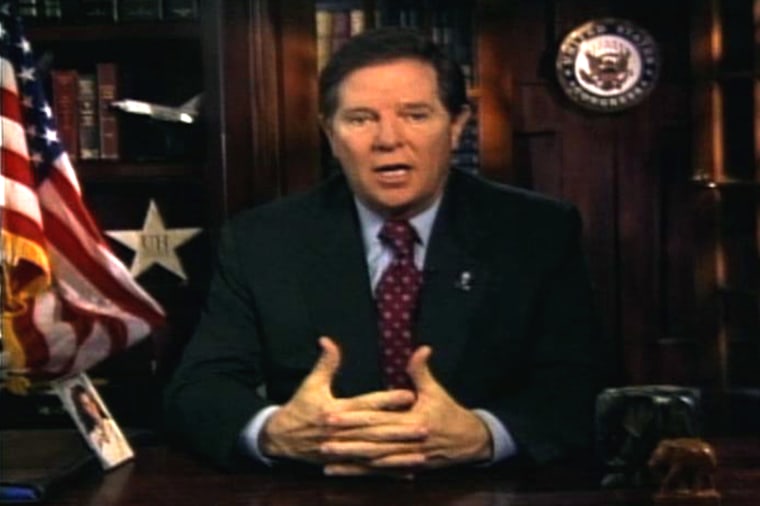Democrats won’t have Tom DeLay to kick around anymore. But in the first hours after the former House Majority Leader announced he was quitting the House, Democrats were trying to keep the symbol of DeLay — and what they see as the embodiment of “the culture of corruption” — vivid in voters’ minds.
For Democrats, the Nov. 7 elections, even without DeLay on the ballot, will still be a national referendum on DeLay.
Democrats need a net gain of 15 seats to reclaim control of the House, which they lost in 1994.
Democratic Whip Steny Hoyer, D-Md., chuckled with delight as he discussed DeLay’s political demise Tuesday afternoon.
Democrats' delight
DeLay’s Democratic adversary Nick Lampson “obviously ran him out of town — literally. That’s pretty awesome,” Hoyer laughed as he chatted with reporters.
In Hoyer’s view of the election, “it will be a referendum on the policies that have been driven by adherence to special interests that have not served the American people…. We will very clearly draw a relationship between the politics of corruption and the politics of special interests and the policies that have been adopted.”
DeLay is set to stand trial for violations of Texas election finance laws and has not been indicted for any actions in connection to lobbyist Jack Abramoff, who has pled guilty to conspiracy, fraud and bribery.
Democrats were reluctant to let DeLay go out the door without kicking him several more times.
"Tom DeLay is a chicken," proclaimed an e-mail from Jim Dean, brother of Democratic National Committee Chairman Howard Dean and head of Democracy for America, the political action group that Dean founded.
We didn't think DeLay would ‘cut and run’ like he did. If he did nothing wrong — as he claims — then Tom DeLay shouldn't be afraid of a re-election campaign in a district he drew for himself,” Dean said.
Can GOP keep DeLay's seat?
DeLay’s explanation for dropping out of the race was pragmatic: he figured he couldn't win in November and so the Democrats would be one seat closer to a majority.
"Every seat is precious," DeLay told MSNBC's Chris Matthews in an interview on Hardball Tuesday. "My constituents deserve a Republican to represent the 22nd district and now we'll have one." (DeLay also predicted that if Democrats gained the House majority, they would try to impeach President Bush.)
House Majority Leader John Boehner, R-Ohio said DeLay “understood that it was becoming a referendum on him, instead of on the ideas between the two parties, and I think he did a very honorable thing by stepping aside.”
Those, who like Boehner look at the November House elections as a seat-by-seat effort, have reason to think that DeLay’s exit makes the Texas district seat more secure for the GOP. President Bush won the district with 64 percent in 2004.
As important as any legacy of DeLay is the one that may in the end keep Republicans in the House majority: those six House seats he gained for Republicans in Texas through his 2003 redistricting plan. That may be the margin of victory for Republicans in November.
DeLay’s resignation and his move out of his Sugarland, Texas district to Virginia, opens the way for another Republican to run for his seat. His resignation is a recognition that the battle for control of the House really may in fact come down to one or two seats.
Democrats hope not, of course. They want a reprise of the 1994 election where a tidal wave of disaffection sweeps 40 or 50 Republican incumbents out.
No national impact?
Boehner said cautiously, “I’m not sure there will any broad national impact. All of these races are won or lost based on local issues, local candidates, their take on national issues, and I don’t expect it (DeLay’s exit) will have any impact.”
Asked how 2006 is unlike 1994, when Boehner and other Republicans rode the wave to their historic victory, Boehner said the Clinton administration was deeply unpopular in 1994. “They’re the ones who set the stage. We knew that we were going to gain seats as a result of their disfavor, but the genius in what we did was we decided to take that good environment and not be satisfied with winning seats, but to actually tell people what we were for as a way of bringing more people to vote for us. And that’s exactly what happened.”
A million fewer votes were cast for Democrats in 1994 than in the previous off-year election, 1990, and eight million more votes cast for Republican candidates than in 1990, he said.
But if one reverses the parties and applies that exact formula — an unpopular president, a promise from the minority party of a deep ideological change — to today’s races, that scenario could work to destroy Boehner’s majority this fall.
That’s why tangible accomplishments matter: Boehner must give GOP voters a reason to get motivated and vote in November.
“Fiscal responsibility is the big issue in terms of motivating Republican voters,” Boehner said. “I think success in Iraq motivates Republican voters. If I had to pick two issues, those would be the two.”
Boehner acknowledged that the latter issue is out of the hands of House Republicans.
The threat to Boehner’s majority is decidedly larger than the ethical allegations against DeLay.
